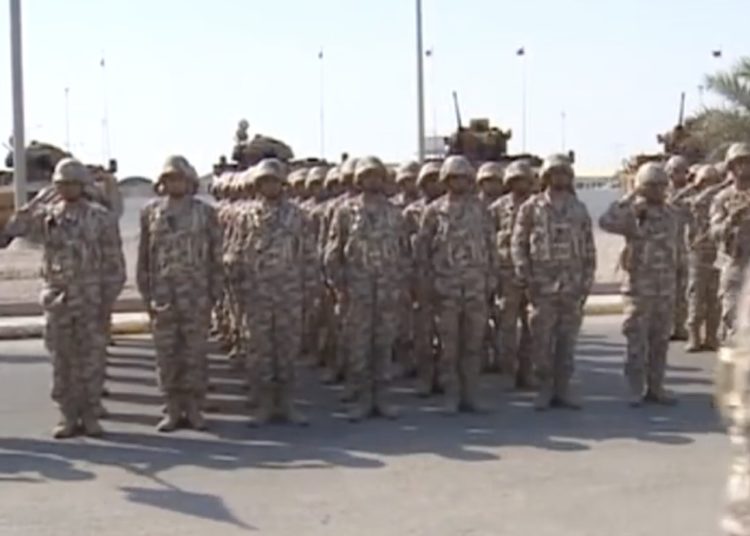Nordic Monitor
Moscow considers removing the foreign military presence, including Turkish troops in Qatar, from Gulf countries as a key condition for stability in the region, the Russian security concept for Gulf area has revealed.
Despite growing ties between Moscow and Ankara in recent years and the relatively successful efforts to ease potential security conflicts between Turkey and Russia, the strategy document unveiled by the Russian foreign ministry on July 23, 2019 shows that Turkey’s increasing regional ambitions clash with Russia’s interests in the Gulf.
“With regard to the situation in the Gulf area, states within the region and extra-regional stakeholders shall …assume mutual obligations of military transparency” including but not limited to “renouncement of permanent deployment of troops of extra-regional states in the territories of states of the Gulf,” the document states.
It is clear that Russia’s Gulf strategy considers Turkish troops in Qatar a threat to regional peace and security. The new concept outlines arms control, joint counterterrorism efforts and the elimination of any foreign military presence as key principles for stability of the Gulf and for eliminating tensions in this strategic area, which have remained high over the past several decades and threaten political and economic wellbeing on a global scale.

According to the concept, Russia intends to take active and efficient steps at the international and regional levels to normalize the situation and overcome the protracted regional crisis. To this end, it also proposes creation of a security and cooperation organization in the Persian Gulf in order to “[downsize] the international military presence in the region and [develop] common confidence-building measures for regional and other states.” Russia believes that the idea of establishing a security system in the Gulf area that is a follow-up to Russia’s proposals worked out in the late 1990s and improved in 2004 and 2007 “might be essential for consolidating political and diplomatic efforts based on international law.”
Relations between Turkey and Russia have grown closer in recent years. In addition to their alliance in defense and energy, they have developed strategies to end the Syrian conflict as well as other regional issues. However, the concept paper reveals that Russia’s regional priorities in Gulf differ from Turkey’s preferences.
The pace of political, commercial and military relations between Turkey and Russia increased with Turkey’s purchase of the Russian S-400 missile defense system, the groundbreaking ceremony to mark the beginning of the Akkuyu nuclear power plant and progress on the TurkStream natural gas pipeline. This lured Turkey away from its traditional alliances with the US and European partners and weakened Turkey’s historical links to its counterparts in the West. Turkey acquired Russia’s S-400 air defense system despite the threat of US sanctions and objections from its friends in NATO.
While Ankara pushed Turkey-Russia relations forward through strong political will, it also changed its balanced approach towards the region in line with President Recep Tayyip Erdoğan’s personal links to Qatar’s emir, which are based on common ideological views on empowering the Muslim Brotherhood.

Unlike its balanced strategy over the decades, Turkey sided with Qatar in 2017 when Saudi Arabia, Bahrain, the United Arab Emirates and Egypt severed ties with Qatar, officially accusing Doha of supporting terrorism and destabilizing the Middle East. In response to the sanctions imposed by the Saudi-led coalition, Turkey deployed additional troops to its military base in Qatar after fast-tracking legislation to do so, and sent food aid to the import-dependent emirate.
On the day Moscow took its security concept to the United Nations, the Russian defense ministry and the general staff of the Iranian armed forces signed a memorandum of understanding (MoU) that seeks to expand military relations between the two countries. According to experts, the MoU contravenes the spirit of the security concept and could be seen as a sign of Russia’s approach of putting its relations with Iran above other Gulf countries.
President Vladimir Putin is scheduled to visit Saudi Arabia in October. Russia’s Gulf security concept appears to be part of its efforts to set the agenda for his visit. However, the reliability and sustainability of the new mechanism were questioned by experts on the region as a result of the latest developments. On the one hand, the new mechanism underlines maintaining the traditionally friendly relations with all the Gulf countries on the basis of equality and mutual respect, while on the other, Russia is deepening its military ties with Iran, a regional actor that was recently accused of being behind the sabotage of oil tankers in the Persian Gulf.
The MoU, which was signed by Iran and Russia in St. Petersburg, is regarded as a turning point in both countries’ military cooperation. According to the Iranian media, joint Russian-Iranian exercises are soon expected to be held in the Persian Gulf and may also take place in the northern part of the Indian Ocean, including in the Strait of Hormuz.
Turkey set up a military base in Qatar as part of an agreement signed in 2014, and in 2015 Qatar and Turkey established the Supreme Strategic Committee to enhance their relationship. In that context, the first Turkish troops were deployed to Qatar in 2015. After the boycott imposed by Saudi Arabia, Egypt, the United Arab Emirates and Bahrain in June 2017, Qatar sought Turkey’s security and military assistance. Turkey beefed up its presence at the base, which has the capacity to accommodate 3,000 troops, in December 2017.
Qatar’s investments in Turkey total more than $20 billion, the second highest level of investment by any country in Turkey. In August 2018 Sheikh Tamim bin Hamad Al Thani pledged to invest $15 billion in Turkey, which was collapsing as the lira depreciated against the dollar due to tensions between Ankara and Washington. Qatar’s emir also presented his Boeing 747-8, worth an estimated $400 million, to the Turkish president as a symbol of “Thani’s special love for Erdoğan,” according to Turkey’s state-run broadcaster TRT.












